A Casino President, Too
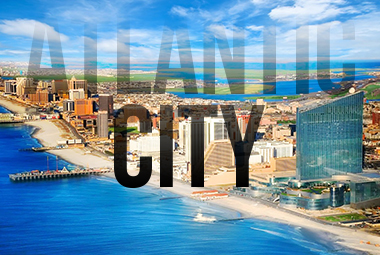
Donald J. Trump has had his name on a great many things. Buildings, hotels, the desk in the Oval Office, perhaps a, “Big beautiful wall,” pretty soon. Either way, the guy has dabbled in a lot of stuff, though his main focus has been real estate development. What kinds of other stuff, you may ask?
For one thing, Donald Trump has appeared on television and other forms of media. Many people have forgotten this, but he actually makes a very brief appearance in Home Alone 2: Lost in New York. Beyond that, our President has appeared on WWE television and Pay-per-Views on numerous occasions. He has been featured in a recording that he did not know was taking place during which he described his...ah...controversial approach to attempting to get to know women.
As if that weren’t enough, he would also be the host and star of The Apprentice, a long running series in which he would groom people for the world of business through a bunch of zany, and often comical tasks. It was during this run that his catchphrase, “You’re fired,” would become part of the national lexicon. Granted, it had been used before that, but Trump made it more popular.
For every success, most of them major, there has been a small failure here and there. For one, Trump Steaks was a complete and total flop that nobody had any interest in. Another flop was his board game, though I wouldn’t be surprised were that making a resurgence given the undying loyalty of his staunchest supporters.
(Please note: I’m not making fun of them. I’m saying that he has a ton of supporters who all really seem to love and admire him. It’s a compliment. Please nobody get offended.)
His notion of an institution of higher education, Trump University, which provided literally nothing of value to its, ‘Students,’ would go on to get sued. The Democrats have branded him a, ‘National embarrassment,’ on multiple occasions while the Republicans have even had to reluctantly admit that there have been a few occasions, even in their view, that the President has said some less than ideal things.
The White House has a revolving door in front of it like an 80’s shopping mall, with scores of staff, and would-be staff, (Anthony Scaramucci was technically fired before officially starting his job) parading in and out. The Rightists say that everything is going swimmingly and the country is FINALLY heading in the right direction, conveniently ignoring the fact that Trump was once a Democrat and still holds some of their views. Hardcore Leftists scream to anyone willing to hear, and even some people not willing to hear, that the end of the world is nigh and the Supreme Leader of North Korea, Kim Jong-un is going to fire off some nukes at us in this century’s game of MAD (Mutually Assured Destruction) because of something that Trump covfefe’d off on Twitter, probably half-asleep when he did it.
In the meantime, the rest of us boring people continue to put one foot in front of the other and walk from one day into the next as though everything is normal, because it basically is.
There are stock market ups and there are stock market downs. There are natural disasters, mass shootings and any number of other incidents for which the President is going to catch some sort of blame, or otherwise be accused of handling poorly, pretty much regardless of what he actually does. If the President leans Right, then many Leftists blame him for everything and no positive developments, even those that would otherwise be ascribed to a Leftist President, could possibly be his doing. If the President leans Left, then the opposite happens. This is ever more the case as we see a conflict of generations as well as moral and philosophical differences (likely the latter two more than anything) which has resulted in a greater chasm between friends, family, neighbors and co-workers than any that this country has experienced in recent memory.
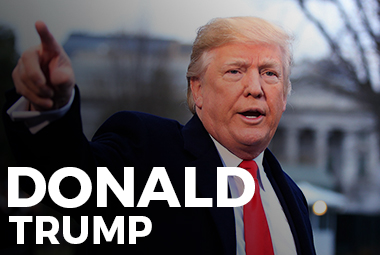
And, with an exasperated sigh, the Leftists will quip, “At least Bush was funny.”
I mean, he was.
Anyway, all of that is exhausting, and while it made for a fast-paced introduction, we’re done with it. What we are going to move on to now is Donald Trump, one of the, “People in Gambling.”
Granted, were he not the President, I probably wouldn’t be writing this. However, I am a slave to my master Google, so I like to write what Google thinks will result in some hits. “Donald Trump and Casinos,” as a search term, that sort of thing. Good times. I’m sure there are people out there unaware that he owned a casino.
While the company known as Trump Entertainment Resorts Inc. would come into being in 1995, in order to really get to know the history of Donald Trump in the world of gambling, we have to go all the way back to 1982, before some of you reading were even born. A few years prior, Trump began snatching up properties along the Atlantic City Boardwalk with the intention of building his own casino on one, or more, of them. In 1982, in apparent anticipation of when he might finally pull the trigger on his idea, he became licensed by the New Jersey Gaming Commission.
The license would enable him to own his own casino, or in the alternative, to operate a casino owned by someone else. The latter is what happened first as, in 1982, Trump would be approached by Holiday Inn with an interest in having him manage the construction of a new casino. That casino would open as Harrah’s at Trump Plaza in May of 1984, and the casino performed at sub-par levels for two years. This would result in some conflict between Trump and Holiday Inn, and it is important to keep in mind that Trump did not actually manage casino operations, he managed the construction of the property, but had a partnership.
In 1986, Trump would buy out Holiday Inn and remove the, “Harrah’s,” from the name so as not to be confused with Harrah’s Marina, (especially since Harrah’s no longer had anything to do with it) and so with that the casino would rebrand simply as, “Trump Plaza.” According to this research paper/article.
Trump would blame Harrah’s, stating that the property had been built to be a high-roller destination and that the built-in Harrah’s clientele actually acted as a detriment to the property, given that Harrah’s was, in his opinion, considered a casino for low-rollers. Trump’s entire ownership stake in the property had essentially been handed to him in exchange for him overseeing the construction, as of that point, but that didn’t stop him from claiming that he Harrah’s name was pulling him down. Either way, Holiday Inn and Trump ended up parting ways with the latter buying out the rest of the former’s ownership stake.
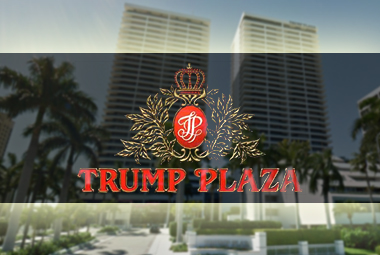
The Plaza would cruise along at a pretty steady quip over the next few years. It was easy enough, in addition to being located right beside the Atlantic City Convention Center, Trump had also purchased the flagging Atlantis Casino and repurposed it to a Trump Regency, essentially to serve some of his Trump Plaza customers. Things were going so smoothly, in fact, that Trump believed the market had more untapped potential, and would go on to erect and open the Trump Taj Mahal.
We’ll get into the fate of the Taj Mahal later, what matters for the time being is the fact that the Trump Plaza and Trump Taj Mahal existed very close to one another, and what you ended up with was an oversaturation of the A.C. market given the number of people who would become Taj Mahal visitors. This left the Trump Plaza ailing, and without getting into the financial specifics, the casino-hotel would enter into a prepackaged bankruptcy in order to restructure its debts, which it could not meet, to its creditors. Part of this structuring would include some preferred stock to those same creditors.
It was during this time that Trump would attempt to have eminent domain declared upon a woman who owned a neighboring property, because it was in the way of where some of his parking was meant to be for the casino expansion project. At Trump’s direction, the city declared her house condemned, though she fought it in court and prevailed.
In 1985, ownership would be passed to the Trump Entertainment Resorts company, as well as the ownership of the Trump Regency hotel, and that takes us to the Trump Taj Mahal.
In 1983, Resorts International would break ground on a site meant to be monikered the Resorts Casino Hotel, located on the Atlantic City Boardwalk. Though the initial projected costs of the project would be 250 million dollars, that amount would balloon to nearly a billion after Trump took over the project, but we’re getting ahead of ourselves a little bit. Resorts International would lose its head, James Crosby, who was the only member of the company with sufficient experience in large-scale developments.
With experience in the city already under his belt, Trump would go on to buy a majority interest in the company for 79 million dollars, with the goal of constructing the biggest and most expensive casino property to date. Ultimately, he accomplished both of those things.
However, he had a minor issue as, at the time, the State of New Jersey would not allow a person or company to own more than three casinos. The result is that Trump determined that he would sell what was and is Resorts casino after the completion of the Trump Taj Mahal, leaving him with both that and the Trump Plaza. The reason this came about was, after acquiring a controlling interest in Resorts International, the result was that he also had a controlling interest in Resorts Casino.
After a long and complicated legal battle for ownership between Trump and Merv Griffin, (Yes, that one) the result would see Trump purchasing the Taj Mahal property while Griffin, who had initially completed the hostile takeover of Resorts International, would retain Resorts and anything else associated therewith. Trump would buy the Taj Mahal property off of Griffin, as part of the settlement, for 273 million. Trump would sell junk bonds to obtain the money needed to finish the property, nearly 700 million dollars, with the intent to default on them by way of another structured bankruptcy. The result, similarly to Trump Plaza, was Trump conferring a 50% business interest upon the stakeholders, who were the former bondholders. Essentially, they all became partners in the business, for lack of a better term. Trump Hotels and Casino Resorts would go on to buy the property several years later. It performed quite admirably, and was the highest grossing casino in the entire city every year until the Borgata opened. The end, as we all know, came relatively quickly after.
Finally, Hilton Hotels would build the Trump Castle (later Trump Marina) in 1985, only to be denied a gambling license by the State of New Jersey due to some unsavory ties. Perhaps fortunately for them, Trump was interested in the property and, most importantly, he already had a gambling license as he was battling to get the Trump Plaza under his control.
Much like with the Trump Taj Mahal, revenues would take a nosedive in the early 90’s because Trump, once again, was competing with himself for his own customers after the opening of the Trump Taj Mahal. It was then that perhaps one of the most humorous things to ever happen at any casino in Atlantic City occurred:
The story goes that Trump Castle was desperate for some cash so that it could meet its minimum financial obligations. Therefore, Fred Trump decided to come in and purchase 3.5 million dollars in casino chips that I suppose he was going to hold until his son said, “Hey, Dad, you can come in and cash those, now.” Anyway, a slap-on-the-wrist fine was administered by Gaming due to the nature of this loan. It was determined to be illegal, of course, but no real harm was done. The casino had cash and Trump’s debt technically had a negotiable financial instrument, provided the casino would continue to operate.
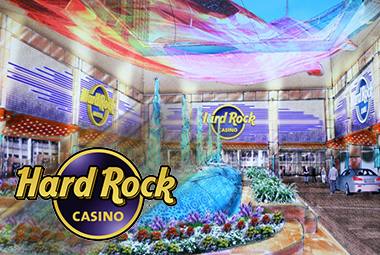
This is going to sound really familiar, but after a prepackaged bankruptcy, the property’s bondholders would acquire a 50% ownership stake in the hotel. Like I said, stop me if you’ve heard that one before.
It wouldn’t last long as Trump would soon regain sole ownership of the property, and then proceed to sell it to his publicly traded outfit, essentially placing all of his casino properties under the same corporate umbrella. Perhaps ironically, Trump decided to try to wheel a 50% stake to rack up some cash with plans to turn the property into a Hard Rock Hotel and Casino. It may not have been the property that would become the Golden Nugget, after a stint as Trump Marina, but Hard Rock would go on to own Trump’s one-time pride and joy, the former Taj Mahal.
In fact, it would not be Trump to sell the property that would later become the Golden Nugget, despite multiple attempts. Trump turned down one offer after another as Atlantic City property values continued to nosedive around him as the area was one of the hardest and most violently hit by the recession. Not helping matters any was the fact that some nearby states were just starting to get legalized Commercial Gambling, so while Atlantic City once enjoyed the patronage of some 30-40% of the country, that would soon be no more, regardless of what the economy is doing.
The company that would become Trump Entertainment Resorts, as an entire company, filed for bankruptcy on four separate occasions. The first bankruptcy of the new MIllennium would operate pretty similarly to the individual casino bankruptcies that had preceded it. Essentially, it was nothing more than a means of restructuring debt by way of conferring an ownership stake unto the bondholders in exchange for debt reduction. Trump would call it a bankruptcy in name only, and that’s basically what it was.
Another bankruptcy would come to pass in 2009, which was certainly not one in name only. At the end of it all, Trump would see the company named after him almost completely be out of his control, emerging with 5% in stock by way of ownership directly, and then another 5% in stocks for the use of his name and likeness since he would no longer have anything to do with the direct management of Trump Entertainment Resorts. TER was effectively without its, ‘T.’
The company would go into its final bankruptcy in 2014, which resulted in an almost immediate closure of the Trump Plaza. The final casino bearing the Trump name in Atlantic City would be the Trump Taj Mahal, a casino in which Carl Icahn would acquire total ownership only two years later. Trump when into Atlantic City in a ball of fire and would end up flickering out, or did he?
Personally, I think that Trump deserves some credit for his vision that would result in the Trump Castle as well as the Trump Taj Mahal. Granted, they were sold for less and less and debt reduction after debt reduction every single time, but ultimately, both of those physical locations will be operating by this Summer, it has been reported. The Trump Plaza, not so much, of course. Granted, none of the casinos will bear the, “Trump,” name anymore, but everyone knows who was responsible for the construction of the Trump Plaza, as well as the completion of the Trump Taj Mahal.
Beyond that, Atlantic City wasn’t built to weather the storm of a massive Economic recession, as first and foremost, it’s going to result in a reduction, sometimes forced and sometimes chosen, to discretionary income. People simply aren’t going to go to Atlantic City and gamble when they don’t know if they are liable to wake up the next day having lost their jobs.
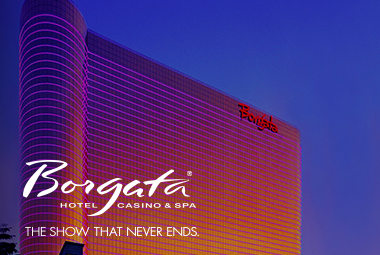
In the meantime, at the time that the Taj Mahal was constructed, Trump couldn’t have known that The Borgata was going to come in and basically annihilate it. While it may come as a surprise to many people, The Taj was not the hulk with peeling plaster, half-painted walls and missing lights that some of you may remember from the last time you saw it. It was an absolute marvel to behold, a construction project the scope, size and expense of which had never been previously seen. The only person able to put something like that together has to be a balls-to-the-walls type willing to put in the work and take a huge risk to see his vision through, damned be the consequences.
Of course, you want a casino property to make a profit, but in his soul, I think Trump wanted something even more than that with the Taj Mahal. He wanted to build something extraordinary, and he did. For a long time, The Taj was Atlantic City’s greatest casino by any objective measure, if not the greatest in the world for a very brief period.
The bankruptcies were unfortunate, sure, but Trump branded properties in Atlantic City are hardly the only properties anywhere to enter into a prepackaged reorganization type deal by which ownership stakes are conferred upon bondholders that the property cannot afford to pay on schedule. Quite the contrary, in fact, Trump sold the, “Junk Bonds,” knowing that precise event could happen, and those who bought the Junk Bonds knew it, as well. At least, if they did their research, they should have known it.
They’re called, “Junk Bonds,” for a reason. No, not because they’re junk, but because they are a huge risk as the enterprise the bonds are being used to finance can become junk, sometimes quickly. It’s much better to end up with an ownership stake in the property than to end up with the virtually nothing that the bondholders would have received had the property liquidated its assets and sold to the (likely only) bidder.
Compare the Trump branded properties to the Revel for a minute. With the Revel you have a huge construction at over one billion dollars, which after a few restructurings of debt, would ultimately go under and be sold for a total of under 100 million, all assets included. Even after that happened, assuming that it reopens as Ocean Resort, that sparkling new property will have sat idle for nearly four years. That’s insane even to think about!
Also, think about the interest rate on the originally-issued junk bonds to finance the completion of the Trump Taj Mahal, 14%!!! If you want to talk about a risky borrower, that’s the sort of interest rate that risky borrower gets! An individual’s credit rating could be in the toilet, swirling and on its way down the pipes, and banks will still finance an automobile at a better interest rate than that.
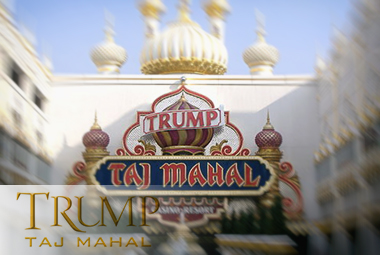
In the meantime, until final closures (or sale to become Golden Nugget) I don’t believe that any of the Trump-branded properties ever discontinued operations. In other words, here you have three properties that have been operating since the 80’s and who all went to 2014, 2016, or beyond in the case of Golden Nugget. In other words, every single one of those casinos were objectively much more successful than the Revel.
The casinos would enjoy every bit as long a run, almost, as other shuttered places, such as The Atlantic Club. Built in the 80’s, closed in the 2010’s.
Besides, and this can’t be stated enough, the Trump Taj Mahal was the highest-grossing casino in the city for a decade and a half.
It’s even more important to consider the human value to the city. Whether or not it took several reductions in debt for the casinos to be viable, and whoever declared that they wouldn’t be a risky venture, construction jobs were created to build the casinos as well as all of the jobs within their walls. Countless people were employed over the decades by those three, and other, casinos. Beyond that, people came into those properties, gambled and had a great time.
In order to be as relevant as possible on a national scale, Atlantic City had to continue to try to build anew in order to afford its visitors as many up-to-date options as possible. Trump’s natural approach to doing that is to build the, “Best,” whatever it is he is building. Everything is ultimately supposed to be big and beautiful. Whatever the end result, there is no disputing that he got them built and that the city was better off for it.
Except for that eminent domain attempt, of course, that was about as low as low gets. I strongly suggest you read about it. I would have went into more detail, but I don’t want to get myself accused of any unnecessary, “Trump-bashing.”
Trump may have left the city, now fully divested from any of the Atlantic City properties, but while he was there, he built some incredible casinos that drew a ton of visitors.
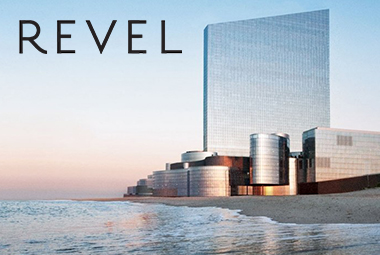
Besides that, these sorts of things were hardly unique to Trump, or Revel. Unless the casino in question is the relatively new Borgata, any casino owned by CET or the Tropicana, every single casino ever to open would eventually find itself in bankruptcy, shuttered or with major ownership shake-ups as a result of would-be insolvency. In fact, the Tropicana probably technically falls under the last purview, so just the CET properties and Borgata. Sometimes, he who lives by the market dies by the market, and there’s not much that can be done about the overall market.
Conclusion
You can say whatever you want about Donald Trump as a person, as a President or as a casino-owner, but one thing will remain undeniable, he built some big and beautiful buildings that will go on for years to come. If not in the physical sense, they will continue in the memories of their customers.
The Trump Taj Mahal, at one time, will always have been the biggest and most expensive casino ever built. For several years, Atlantic City’s leading casino in revenues. The project had stalled out and was looking hopeless until Trump came in and, you may say, “By hook or by crook,” but damnit, he found a way to finish the project. He did the same thing with the Trump Plaza.
If you have visited Atlantic City since the mid-80’s, or so, and have enjoyed yourself, you have one President Donald J. Trump, in part, to thank for that. The companies, many as they were, then consolidated, then broken up again, may not have fared well, but Atlantic City was better for Trump being there. The enjoyment of the guests is undeniable, the job creation is undeniable, the aesthetic appeal is undeniable...and remember, the State of New Jersey taxes based on gambling win, nor profits, so profits don’t really matter to them, as long as there are people there gambling.
And, By God, there were people there gambling.



